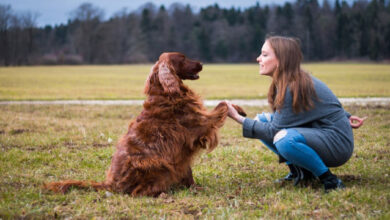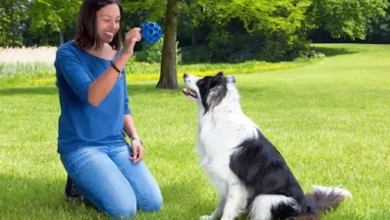
Wondering when to start training a dog? The answer is simple: as early as possible! Puppies can begin learning basic commands like sit and stay at just 8 weeks old—the perfect age to shape good habits and prevent future problems. Training early doesn’t just teach obedience; it builds trust, prevents fear, and turns your pup into a confident, happy companion. Whether you have a playful puppy or an older dog, this guide breaks down the best training methods, schedules, and mistakes to avoid. Let’s get started!
The Importance of Early Dog Training
Training your puppy early is the best way to raise a happy, well-behaved dog. Starting young stops problems before they begin and helps you and your pup become closer.
Building Good Habits for Life
Puppies learn best between 8–16 weeks old. This is the ideal time to teach simple commands like sit, stay, and come. Early training stops bad habits like jumping on people, chewing shoes, or barking too much. For example, teaching your pup to walk nicely on a leash now means no pulling later. Daily routines—like potty breaks after meals—also make life easier for both of you.
Creating a Strong Friendship
Training helps you and your dog understand each other. When you reward good behavior with treats or praise, your dog learns to trust you. This teamwork builds a loving bond. For example, teaching “leave it” during walks keeps your dog safe and shows you’ll protect them. Over time, your dog will feel secure and listen to you happily.
By training early, you’ll have a confident, calm dog who loves walks and spending time with you!
When Should You Start Training a Puppy?
Training your dog at the right time sets them up for success. Here’s a simple breakdown of when to start and what to focus on at each stage.
8–12 Weeks: The Critical Socialization Window
This is the best time to start training. Puppies are curious and open to new experiences. Focus on:
- Basic commands: Teach sit, stay, and their name using treats and praise.
- Potty training: Take them outside after meals, naps, and playtime. Reward them for doing their business outdoors.
- Socialization: Introduce them to gentle people, friendly dogs, and everyday sounds (cars, vacuums). This prevents fear later.
Keep sessions short (5–10 minutes) and fun!
3–6 Months: Expanding Skills
Your puppy is ready to learn more. Build on their basics with:
- Leash walking: Practice walking without pulling. Stop moving if they tug and reward calm behavior.
- Advanced commands: Try down, leave it, or come. Use high-value treats like chicken.
- Reducing nipping/chewing: Replace your hand with a toy when they bite. Say “no” firmly but stay calm.
Consistency is key—practice daily!
Older Dogs: It’s Never Too Late
Adult dogs can learn new tricks! Older dogs might take longer, but they’ll still succeed with:
- Patience: Break tasks into small steps. For example, teach “sit” before “stay.”
- Positive reinforcement: Reward good behavior with treats, play, or affection.
- Routine: Stick to a daily schedule for walks, meals, and training.
Whether your dog is 2 years or 10 years old, training strengthens your bond and keeps their mind active.
Start today—every dog deserves to learn!
Key Training Methods for Success
Training your dog doesn’t have to be complicated. Use these simple, effective methods to teach commands and build good behavior.
Positive Reinforcement Techniques
Reward good behavior with treats, praise, or playtime. For example, say “good job!” and give a small treat when your dog sits on command. Avoid yelling or punishment—this scares dogs and makes them lose trust in you. Instead, ignore bad behavior (like jumping) and reward calm actions. Over time, your dog will repeat what earns them rewards.
Using Meals as Training Tools
Turn your dog’s meals into fun training sessions! Use their regular kibble to teach focus and commands. For example:
- Hold a piece of kibble in your hand and say “sit.” Reward them with the kibble when they obey.
- Practice “stay” during mealtime by asking them to wait before eating.
This saves treats and keeps training short (5–10 minutes). Plus, it makes mealtime mentally stimulating!
Tip: Break kibble into tiny pieces so your dog stays motivated without getting full too fast.
By staying positive and using everyday moments to train, you’ll help your dog learn faster and enjoy the process!
Puppy Training Schedule by Age (With Milestones)
Training your puppy at the right age helps them grow into a confident, well-behaved dog. Here’s a simple breakdown of what to focus on as they grow:
8–10 Weeks: Laying the Foundation
Start with potty training basics by taking your puppy outside every 1–2 hours, especially after meals, naps, and playtime. Reward them with praise or a small treat when they go potty outdoors. Introduce socialization by gently exposing them to new sounds (like traffic or doorbells), different surfaces (grass, tiles), and handling their paws, ears, and mouth. This builds confidence and reduces fear later.
11–14 Weeks: Building Core Skills
Teach your puppy to master sit, come, and leave it using short, fun sessions. For example, practice “come” during playtime by rewarding them with a treat when they run to you. Begin crate training by making the crate cozy with blankets and toys. Feed meals inside the crate to create positive associations. This helps your pup feel safe and prevents separation anxiety.
15+ Weeks: Polishing Good Behavior
Work on leash manners by stopping walks when your puppy pulls and rewarding them for walking beside you. Take short public outings to quiet parks or pet-friendly stores to practice calm behavior around distractions. Discourage jumping by ignoring them until they sit and rewarding calm greetings. For barking, redirect their attention with a toy or command like “quiet,” and reward silence.
With patience, your pup will grow into a well-behaved companion!
5 Actionable Tips for Effective Training
Training your dog doesn’t have to be stressful! Follow these simple tips to make learning fun and effective for both of you.
Keep Sessions Short & Sweet
Dogs get bored quickly. Limit training to 5–10 minutes at a time. For example, practice “sit” during TV commercials or before meals. Short sessions keep your dog focused and excited to learn.
Use Tasty Treats for Tough Tasks
Save high-value treats (like chicken, cheese, or hot dogs) for challenging commands like “come” or “stay.” These special rewards motivate your dog to try harder. Use regular kibble for easier skills like “sit.”
Start in a Quiet Space
Begin training in a calm area like your living room. Once your dog masters a command there, slowly add distractions (e.g., practice “stay” in the backyard before trying it at the park).
Always End with a Win
Finish each session with something your dog does well, even if it’s just a simple “sit.” Praise them warmly and give a treat. This leaves them feeling proud and eager for the next lesson.
Be Consistent Every Day
Use the same words (e.g., “down” instead of “lie down”) and stick to a routine. For example, practice “leave it” during walks or “stay” before meals. Repetition helps your dog learn faster.
With these tips, training becomes a fun bonding activity—not a chore!
Common Training Mistakes to Avoid
Training your dog is easier when you avoid these two common errors. Here’s what to watch out for and how to fix it:
Skipping Socialization
Puppies need to meet new people, animals, and places between 8–16 weeks old. If they don’t, they might grow up scared of everyday things like strangers, cars, or other dogs. This fear can turn into aggression (barking, growling) later. To socialize safely:
- Introduce your pup to gentle kids, friendly dogs, and different environments (parks, sidewalks).
- Keep experiences positive—reward calm behavior with treats or praise.
A well-socialized puppy becomes a confident, friendly adult dog.
Inconsistent Commands
Dogs get confused if you use different words for the same command. For example:
- Saying “down” sometimes and “lie down” other times.
- Letting family members use different cues like “come” and “here.”
Fix it:
- Choose one word for each command and stick to it.
- Make sure everyone in the house uses the same words.
Consistency helps your dog learn faster and reduces frustration for both of you!
By avoiding these mistakes, you’ll set your dog up for training success.
FAQs
Can you train a 6-month-old dog?
Yes! Older dogs can learn new tricks with patience. Start with basic commands like sit and stay. Use treats and praise to motivate them. Training helps adult dogs stay mentally active and builds trust.
How long does potty training take?
Most puppies learn potty training by 4–6 months. Stay consistent—take them outside after meals, naps, and playtime. Reward success with treats or praise. Accidents will happen, but don’t scold—just clean up and try again.
What if my dog ignores commands?
If your dog ignores you, use higher-value treats (like chicken) or practice in a quieter area. Avoid repeating commands—wait for them to respond. If they’re distracted, shorten the training session or try again later.
Conclusion
Training your dog is one of the best ways to show them love. Start early—begin with simple commands like sit and stay as early as 8 weeks old. Use positive reinforcement (treats, praise, or play) to make learning fun. Every dog learns at their own pace, so adjust sessions to match their energy and focus.
Stay consistent with daily practice, even if it’s just 5 minutes a day. Be patient—mistakes are normal, and progress takes time. Over weeks and months, your dog will grow into a calm, confident companion who trusts and listens to you.
Remember, training isn’t just about obedience. It’s about building a happy, lifelong friendship with your pet. Start today, and enjoy the journey together!
Reference links:
- PetMD: When to Start Training a Puppy
https://www.petmd.com/dog/general-health/when-start-training-puppy
Explains the ideal training timeline and early socialization tips. - The Puppy Academy: Complete Puppy Training Schedule
https://www.thepuppyacademy.com/blog/2020/8/24/complete-puppy-training-schedule-by-age
Breaks down week-by-week training milestones for puppies.




